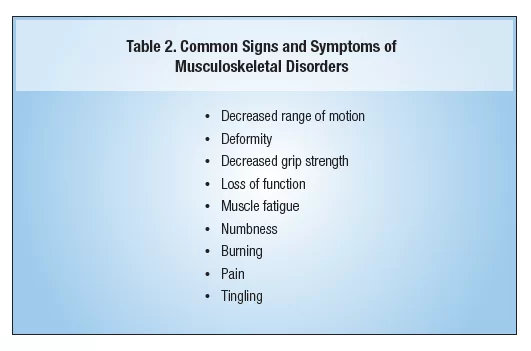What are the signs and symptoms of common musculoskeletal injuries?


Musculoskeletal injuries are common and can occur due to various reasons such as accidents, sports activities, or repetitive strain. These injuries can affect the bones, muscles, tendons, ligaments, and other structures that support the body’s movement. Recognizing the signs and symptoms of musculoskeletal injuries is crucial for early diagnosis and appropriate treatment. In this article, we will explore the common signs and symptoms of musculoskeletal injuries, including joint pain, back pain, sprains and strains, fractures, muscle weakness, limited range of motion, swelling and inflammation, and other orthopedic injuries.
Joint Pain
Joint pain is one of the most common symptoms of musculoskeletal injuries. It can occur in any joint of the body, including the knees, hips, shoulders, and wrists. The pain may be sharp, dull, or throbbing, and it can worsen with movement or weight-bearing activities. Joint pain can be accompanied by stiffness, swelling, and a reduced range of motion in the affected joint.
Back Pain
Back pain is another prevalent symptom of musculoskeletal injuries. It can be localized to a specific area or radiate to other parts of the body. Back pain can be caused by muscle strains, herniated discs, or spinal conditions such as osteoarthritis or spinal stenosis. The pain may be aggravated by certain movements or positions and can be accompanied by muscle spasms or stiffness.
Sprains and Strains
Sprains and strains are common musculoskeletal injuries that affect the ligaments and muscles, respectively. A sprain occurs when a ligament is stretched or torn, usually due to a sudden twist or impact. Symptoms of a sprain include pain, swelling, bruising, and instability in the affected joint. On the other hand, a strain happens when a muscle or tendon is overstretched or torn. Symptoms of a strain include pain, muscle weakness, and limited range of motion.
Fractures
Fractures, or broken bones, are severe musculoskeletal injuries that require immediate medical attention. Fractures can occur due to trauma, falls, or repetitive stress. The symptoms of a fracture include severe pain, swelling, deformity, inability to bear weight or use the affected limb, and sometimes an audible snap or grinding sound at the time of injury. Fractures can be classified as closed (simple) fractures, where the bone doesn’t break the skin, or open (compound) fractures, where the bone protrudes through the skin.
Muscle Weakness
Muscle weakness is a common symptom of musculoskeletal injuries, especially those affecting the muscles or nerves. It can occur due to muscle strains, nerve compression, or conditions such as muscular dystrophy or neuropathy. Muscle weakness can make it difficult to perform everyday activities and may be accompanied by pain, fatigue, or difficulty maintaining posture.
Limited Range of Motion
Limited range of motion is another sign of musculoskeletal injuries. It refers to the inability to move a joint or body part through its full range of motion. This limitation can be caused by joint inflammation, muscle tightness, or structural abnormalities. Limited range of motion can affect daily activities and may be accompanied by pain or stiffness in the affected area.
Swelling and Inflammation
Swelling and inflammation are common responses to musculoskeletal injuries. They occur due to increased blood flow and fluid accumulation in the injured area. Swelling can cause pain, redness, warmth, and a feeling of tightness or fullness. Inflammation is the body’s natural response to injury and is characterized by heat, redness, swelling, and pain. It is important to manage swelling and inflammation to promote healing and reduce discomfort.
Other Orthopedic Injuries
In addition to the signs and symptoms mentioned above, there are various other orthopedic injuries that can occur. These include dislocations, tendonitis, bursitis, stress fractures, and rotator cuff injuries, among others. Each of these injuries has its own set of signs and symptoms, which may overlap with those mentioned earlier. It is essential to seek medical attention if you experience any persistent or severe symptoms related to musculoskeletal injuries.
In conclusion, recognizing the signs and symptoms of common musculoskeletal injuries is crucial for early diagnosis and appropriate treatment. Joint pain, back pain, sprains and strains, fractures, muscle weakness, limited range of motion, swelling and inflammation, and other orthopedic injuries are all common manifestations of musculoskeletal injuries. If you experience any of these symptoms, it is important to consult a healthcare professional for a proper evaluation and treatment plan. Early intervention can help prevent further damage and promote a faster recovery.
Recent Posts
How do I create an engaging and informative online quiz or assessment?
Creating an engaging and informative online quiz or assessment can be a powerful tool for… Read More
What are the most effective methods for managing and reducing work-related stress in the hospitality industry?
Work-related stress is a common issue in the hospitality industry, where employees often face long… Read More
How can I improve my assertiveness and communication skills in a leadership position?
In a leadership position, assertiveness and effective communication skills are crucial for success. Being able… Read More
What are the key elements of a successful employee recognition and rewards program?
Employee recognition and rewards programs play a crucial role in motivating and engaging employees, as… Read More
How do I effectively manage and respond to customer feedback and reviews?
Customer feedback and online reviews play a crucial role in shaping a company's reputation and… Read More
What are the best strategies for effective time management as a stay-at-home parent?
Effective time management is crucial for stay-at-home parents who juggle multiple responsibilities on a daily… Read More